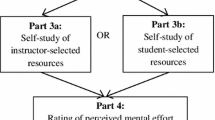Abstract
An experiment was conducted in the context of a problem-based learning course to investigate the influence of a learning-goal-free problem scenario on the quality and quantity of individual study. In half of the tutorial groups, the problem scenario was constructed in such a way that it provided useful learning issues (goal-specified condition), whereas in the other half of the tutorial groups, the problem scenario did not provide learning issues (goal-free condition). It was demonstrated that students in the goal-free condition read more articles, studied longer, and spent more time reporting the studied literature than their peers in the goal-specified condition. These findings suggest that the use of goal-free problems has a positive effect on the students’ individual study and the extensiveness of the tutorial group meeting.
Similar content being viewed by others
References
Albanese M.A., Mitchell S. (1993). Problem-based learning: A review of literature on its outcomes and implementation issues. Academic Medicine 68:52–79
Barrows H.S. (1985). How to Design a Problem-based Curriculum for the Preclinical Years. New York Springer
Colliver J.A. (2000). Effectiveness of problem-based learning curricula: Research and theory. Academic Medicine 75:259–266
Des Marchais J.E. (1999). A Delphi technique to identify and evaluate criteria for constructions of PBL problems. Medical Education 33:504–508
Dolmans D. (2003). The effectiveness of PBL: The debate continues. Some concerns about the BEME movement. Medical Education 37:1129–1130
Dolmans D.H.J.M., De Grave W., Wolfhagen I.H.A.P., Van der Vleuten C.P.M. (2005). Problem-based learning: Future challenges for educational research and practice. Medical Education 39:732–741
Dunlsoky J., Nelson T.O. (1992). Importance of the kind of cue for judgments of learning. (JOL) and the delayed-JOL effect. Memory & Cognition 20:374–380
Hmelo-Silver C.E. (2004). Problem-based learning: What and how do students learn. Educational Psychology Review 16:235–266
Moust J.H.C., Schmidt H.G. (1993). Facilitating small-group learning: A comparison of student and staff tutor’s behavior. Instructional Science 22:287–302
Nelson T.O. (1993). Judgments of learning and the allocation of study time. Journal of Experimental Psychology: General 122:269–273
Norman G. (2003). RCT = results confounded and trivial: The Perils of grand educational experiment. Medical Education 37:582–584
Norman G.R. (2004). Beyond PBL. Advances in Health Sciences Education 9:257–260
Norman G.R., Schmidt H.G. (1992). The psychological basis of PBL. A review of the evidence. Academic Medicine 67:557–565
Norman G.R., Schmidt H.G. (2000). Effectiveness of problem-based learning curricula: Theory, practice and paper darts. Academic Medicine 34:721–728
Schmidt H.G. (1994). Resolving inconsistencies in tutor expertise research: Does lack of structure cause students to seek tutor guidance? Academic Medicine 69:656–662
Schmidt H.G., Moust J.H.C. (1995). What makes a tutor effective? A structural equations modelling approach to learning in problem based curricula. Academic Medicine 708–714
Schmidt H.G., Van der Arend A., Moust J.H.C., Kokx I., Boon L. (1993). Influence of tutors’ subject-matter expertise on student effort and achievement in problem-based learning. Academic Medicine 68:784–791
Son L.K., Metcalfe J. (2000). Metacognitive and control strategies in study-time allocation. Journal of Experimental Psychology: Learning, Memory, and Cognition 26:204–221
Soppe M., Schmidt H.G., Bruysten R.J.M.P. (2005). Influence of problem familiarity on learning in a problem-based course. Instructional Science 33:271–281
Van den Hurk M.M., Dolmans D.H.J.M., Wolfhagen H.A.P., Muijtjens A.M.M., Van der Vleuten C.P.M. (1999). Impact of individual study on tutorial group discussion. Teaching and Learning in Medicine 11:196–201
Van den Hurk M.M., Wolfhagen H.A.P., Dolmans D.H.J.M., Van der Vleuten C.P.M. (1999). Student-generated learning issues: A guide for individual study? Education for Health 12:213–221
Verkoeijen P.P.J.L., Rikers R.M.J.P., Augustus M.I., Schmidt H.G. (2005). A critical look at the discrepancy reduction mechanism of study time allocation. European Journal of Cognitive Psychology 17:371–387
Visschers-Pleijers A.J.S.F., Dolmans D.H.J.M., Wolfhagen I.H.A.P., Van der Vleuten C.P.M. (2005). Students perspectives on learning-oriented interactions in the tutorial group. Advances in Health Sciences Education 10:23–35
Acknowledgement
This study was supported by a grant of the Trust fund of the Erasmus University Rotterdam.
Author information
Authors and Affiliations
Corresponding author
Appendix A
Appendix A
Rights and permissions
About this article
Cite this article
Verkoeijen, P.P.J.L., Rikers, R.M.J.P., Winkel, W.W.R. et al. Do student-defined learning issues increase quality and quantity of individual study?. Adv Health Sci Educ Theory Pract 11, 337–347 (2006). https://doi.org/10.1007/s10459-006-9013-7
Received:
Accepted:
Published:
Issue Date:
DOI: https://doi.org/10.1007/s10459-006-9013-7




